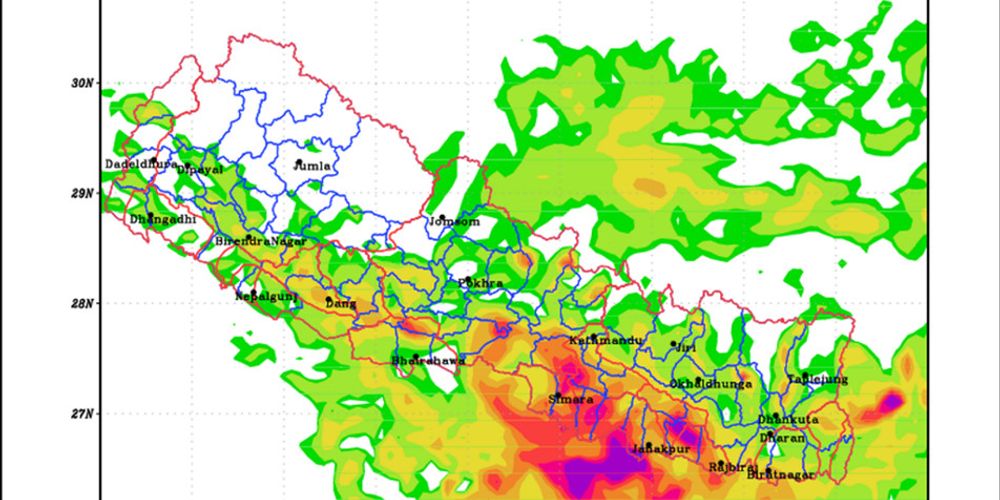
Interviews
3 MIN READ

Monsoon mayhem

As heavy rains across Nepal precipitate a national crisis, we spoke with Rajendra Sharma, a senior divisional hydrologist at Flood Forecasting Section, Department of Hydrology and Meteorology.

Why are we seeing such heavy rain this year?
The main reason for the heavy rain is that the monsoon system’s low pressure zone has at once concentrated and entered Nepal this time around. In the past we saw smaller systems gradually enter the region, but this time the depression zone of the monsoon extends from eastern to central Nepal.
We have also seen cloudbursts, where there is intense rainfall for a short period of time. We estimate that this system will contribute between 70 to 80 percent of the annual rainfall this year.
(NOTE: Nepal’s biggest cloudburst occurred on July 19-20, 1993, in central Nepal, which killed 1300 people. In a period of about 24 hours, the cloudburst dumped nearly half the total rain of that monsoon season.)
What has been the trend in rainfall over the years, and is this due to climate change?
Researchers studying this do connect it to climate change. But the least we can say is that while the total annual precipitation (around 1700 cm on average) in the last 30 years has remained more or less the same, there is growing gap between rainy and dry days. For instance, before the onset of the rain recently, some areas in Terai were being flooded while some saw drought-like weather. According to a forum of scientists in South Asia (SASCOF), this monsoon is expected to be heavier than usual.
Can you tell us about the different monitoring systems you have?
The river-watch system began in 2009 with a couple of watch stations only. At present, we have river-watch system in 30 rivers around Nepal, which record water levels and send us updates every five minutes through GSM cell-phone signals. Due to the flooding, a handful of the river-watch stations were not being able to send us live data. We also get real-time updates on rainfall from 90 different stations.
What kind of links do you have with rescue operations?
We have a 24/7 link with National Emergency Operation Centre and they have a live display board showing our data. We are also sending mass SMS to residents of the potentially dangerous areas. There has been an increase in the traffic to our website also, which is facing some difficulties due to low capacity on our server.

What can we expect in the next few days?
The rain will last at least a one or two more days, according to the rain watch division at the DHM. The system is gradually moving towards the west.
The interview has been edited for clarity and concision.
Photo credit: Rainfall predictions for August 14 to August 15, 2017, Coordinated Universal Time (UTC). Photo credit: Rajendra Sharma and Regional Integrated Multi-Hazard Early Warning System for Asia and Africa (RIMES)

The Record We are an independent digital publication based in Kathmandu, Nepal. Our stories examine politics, the economy, society, and culture. We look into events both current and past, offering depth, analysis, and perspective. Explore our features, explainers, long reads, multimedia stories, and podcasts. There’s something here for everyone.


Live Blog
4 min read
Rolling coverage of developments as the floods hit across the country.
Features
5 min read
Inside Qatar’s deportation centre, migrants detained under woefully harsh conditions
Features
3 min read
Shortage of protective gears, supplies and ventilators in Nepal likely to cripple medical interventions against Covid19
Perspectives
4 min read
Climate change adaptation is not just a matter of flood-tolerant seeds and solar water pumps; it is about crushing age-old structural injustices.
COVID19
3 min read
Many Nepalis are despairing at the Nepal-India border after being denied entry to their own country
COVID19
Perspectives
5 min read
The world’s largest missionary movement cannot be blamed exclusively for its role in the Covid19 pandemic
Photo Essays
4 min read
Kathmandu, our eternally bustling capital, has been lulled into sleep by the forbidding coronavirus
COVID19
News
3 min read
Daily summary of all Covid19 related developments that matter